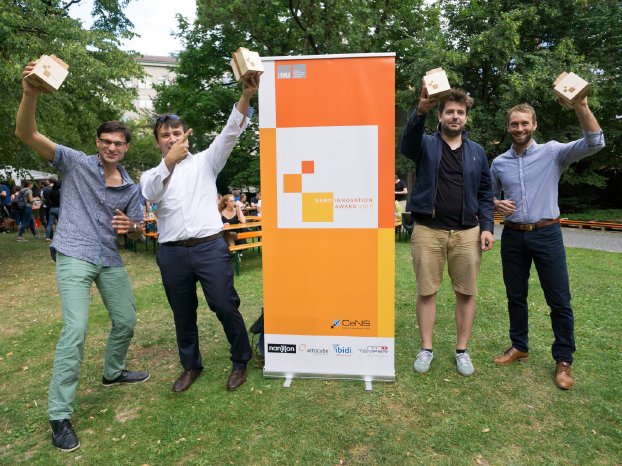While most scientific prizes emphasize on findings and results in fundamental research only, the Nano Innovation Award decidedly attaches importance to future applicability. The prize money is donated by four successful spin-offs of CeNS, all with their own company history directly connected to the idea of the award. The companies attocube systems AG, ibidi GmbH, Nanion Technologies GmbH and NanoTemper Technologies GmbH, together with CeNS, honor gifted and creative junior researchers, whose results are not only interesting for fundamental research but also promising for technological applications.
Florian Schüder from Professor Ralf Jungmann’s group at the MPI of Biochemistry/LMU München received an award worth € 3.000 in the category "Master's thesis". Super-resolution techniques are starting to revolutionize biology by enabling researchers to observe structures inside cells with unprecedented spatial resolution, beating the classical diffraction limit by more than one order of magnitude. However, most techniques are restricted due to technical reasons to structures that are very close to the cover glass, thus preventing whole-cell or tissue imaging with standard instrumentation. In his master’s thesis research, Florian Schüder implemented the recently developed DNA-PAINT super-resolution technique using a minimally modified spinning-disk confocal microscope to extend imaging to whole cells and potentially tissues. Due to the wide availability of spinning-disk microscopes in standard biology labs and imaging facilities, researchers can now answer questions with super-resolution in whole cells and beyond.
In the category “PhD thesis“, the jury split the prize, worth 6.000 EUR, among three awardees.
About the Center for NanoScience (CeNS) – www.cens.de
The Center for NanoScience (CeNS) stimulates and coordinates research in nanoscience in the Munich area. Since its foundation in 1998 at LMU Munich, CeNS has developed into a broad network of researchers from the LMU faculties of physics, chemistry, pharmacy, biology and medicine, including groups from TU Munich, the University of Augsburg, the Max Planck Institute of Biochemistry and other institutions in the Munich area.


